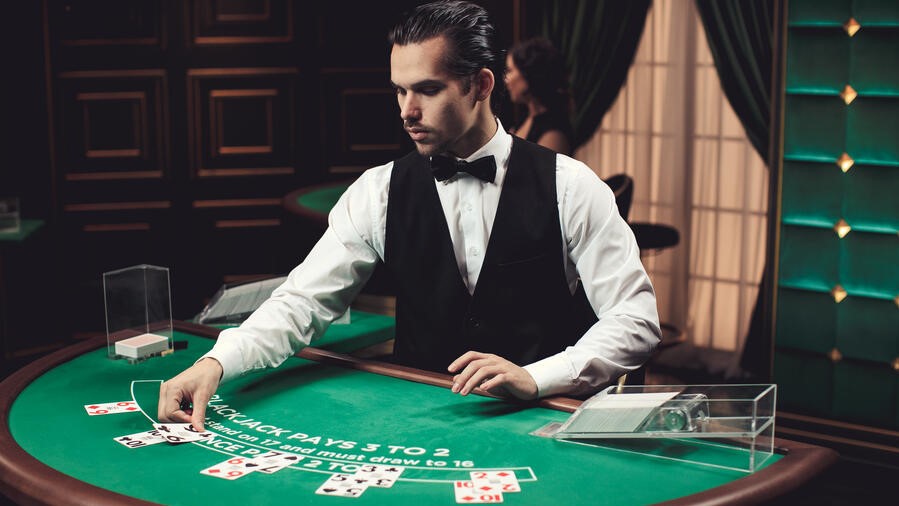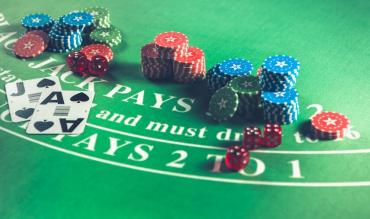Most land-based and online blackjack players have no idea of what taking “Even Money” means to their game. Yet, most players gladly take the even money when it’s offered. In fact, most dealers and fellow players, and sometimes even pit bosses, will encourage players to take the even money because "it’s a sure win." After all, a bird in the hand is worth two in the bush, right?
The even-money proposition comes into play whenever you’re dealt a blackjack hand and the dealer shows an Ace upcard. Say you bet $20 and you happily get a blackjack, but cringe when you see the dealer’s Ace upcard. You have the option to tell the dealer, before she peeks at her downcard, that you would like even money. She will pay you $20 and then remove your cards from the layout. You’ve won even money for your blackjack, even if the dealer subsequently flips over a blackjack of her own.
On the surface, taking even money looks like a “can’t lose” proposition, just as the dealers and pit bosses said. If you take even money, you'll be $20 richer regardless of what happens to the dealer’s hand. On the other hand, if you decline the even money, something very bad can happen; namely, the dealer could also have a blackjack, and you’d end up with nada for your beautiful blackjack. The choice looks clear: Take the sure money.
But hold on, because there’s more to this story.
The problem here is what might happen if you decline the even money. What happens if the dealer doesn’t have a blackjack?
If you have a blackjack, decline the even money, and the dealer doesn't have blackjack, you are going to get paid $30 for your blackjack, which is 1.5 times your initial bet (equal to a 3-2 payout). That's something to consider before you take that “sure” even money.
So let’s review your choices when you get a blackjack and the dealer shows the Ace:
Choice #1: Take the even money and the sure twenty bucks.
Choice #2: Decline the even money and either:
- Win nothing, if the dealer has blackjack
- Win thirty bucks, if the dealer doesn't have blackjack.
It all boils down to this:
- Is it better to take the sure $20 by taking even money
- to decline even money and win $30, or get stuck with zilch?
Most players don't want to risk getting nothing for their blackjack, so they opt for even money and the sure payoff. But guess what? That's the wrong play mathematically, and here’s why.

Say you're sitting tight with your blackjack when the casino says it wants to pay you $20 for the hand. (That is, in fact, exactly what’s going on when the dealer asks you if you want “even money.”) Why, do you suppose, is the casino willing to give you $20 for your blackjack, right there and then, before the dealer peeks at the hole card? It’s certainly not because of your good looks. It’s definitely not because casino managers are being generous.
No, the real reason that casinos are willing to give you twenty bucks for your blackjack is because they know that your hand is worth more than twenty bucks.
How? If you wager $20 and take even money, you'll win $20 one hundred percent of the time. But if you decline the even money, can you guess what percent of the time the dealer will have a blackjack (and you push) vs. the percent of the time she will not have a blackjack, and you joyously win thirty bucks?
Check it out: A six-deck game contains 312 cards, of which 96 are ten-value cards (24 each of tens, jacks, queens, and kings). If you hold a blackjack and the dealer shows an Ace, there are 309 cards left, of which 95 are ten-value cards (remember that you're already holding one ten-value card in your blackjack hand).
Therefore, the chance that the dealer has a ten in the hole is the ratio of 95 over 309, which is 30.7 percent. In other words, 30.7 percent of the time the dealer will get a blackjack and push your blackjack.
It also means that a whopping 69.3 percent of the time, the dealer won't have the ten in the hole, and you'll be $30 richer!
With these percentages, you can easily compute the value of your blackjack hand. Here's how:
- 30.7 percent of the time you win 0 betting units
- 69.3 percent of the time you win 1.5 betting units.
If you average these numbers, you arrive at what many will find to be a surprising result—your blackjack hand is worth about 1.04 betting units. This means that for your $20 initial wager, your blackjack hand is actually worth about $20.80. No wonder the casinos are willing to pay you twenty bucks for your blackjack—they know it’s worth almost $20.80 (and they ain’t telling you).
Here's another fact about even money that most players don't know: Taking even money when you have a blackjack and the dealer shows the Ace is the same as taking insurance on the blackjack.
Suppose you bet $20 and get the blackjack, but the dealer happens to have an Ace upcard. If you want insurance, you make a $10 insurance wager (half your bet). What if the dealer checks her down card and she also has blackjack? Your blackjack ties hers and you push, but you get $20 for your winning $10 insurance wager (2 to 1 payoff), giving you a net profit of $20.
If the dealer doesn't have the blackjack, you lose the $10 insurance bet, but you win $30 on your blackjack (3-2 payoff), for a net profit of—you guessed it—$20. Since insuring your blackjack yields a $20 profit whether the dealer has a blackjack or not, the casino offers players even money right up front.
The bottom line with even money is this: If you always take it, in the long run you'll be giving away approximately four percent of your average profits on the hand. The casino is counting on you to take the even money; next time, surprise them and decline it.
Note: There are three opportunities where it might sense to take even money. First is if a casino is paying 6-5 for a blackjack and offers even money, in which case you will have the advantage. (Don’t get too excited because firstly, you should never play in a 6-5 blackjack game, and secondly, most casinos are not that stupid to offer even money on their 6-5 tables.) The second time is to take even money as a strategic play on a last hand in a blackjack tournament to either overtake an opponent’s bankroll or preserve your bankroll from a potentially nasty negative swing. The third is if you are a card counter and know that there is a greater chance the dealer has a ten-value card in the hole. (I’ll cover these points in future articles.)
